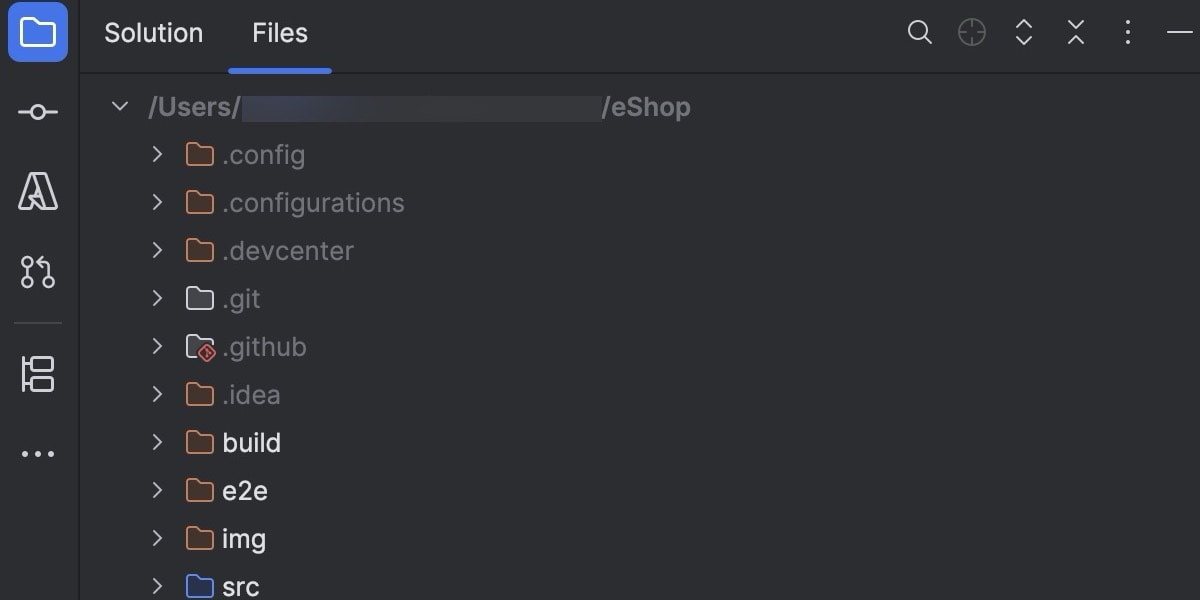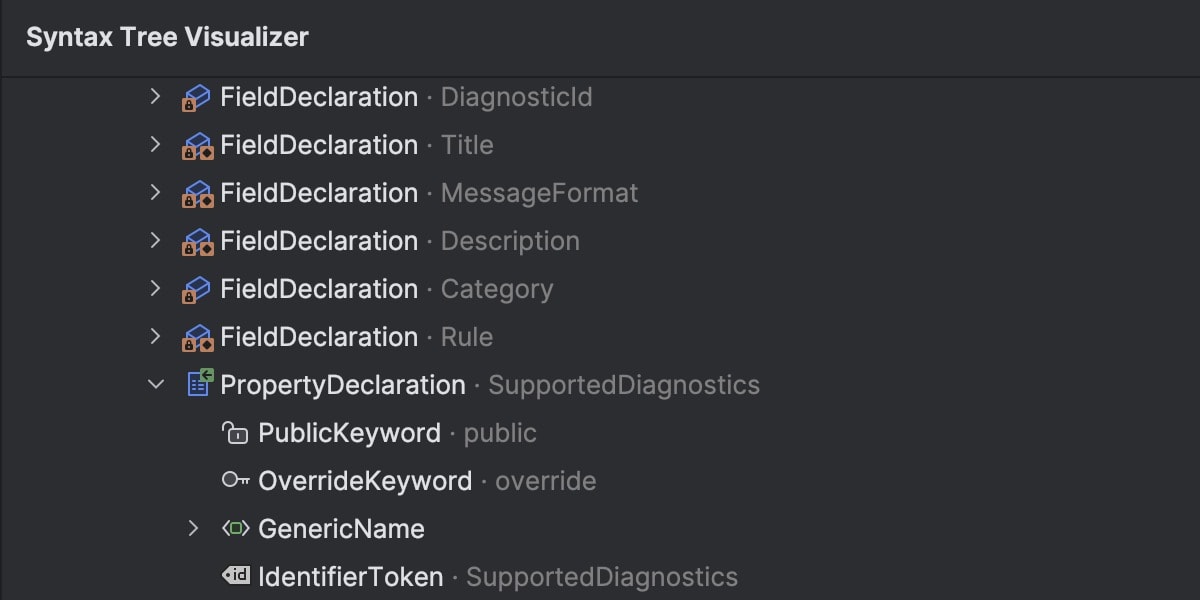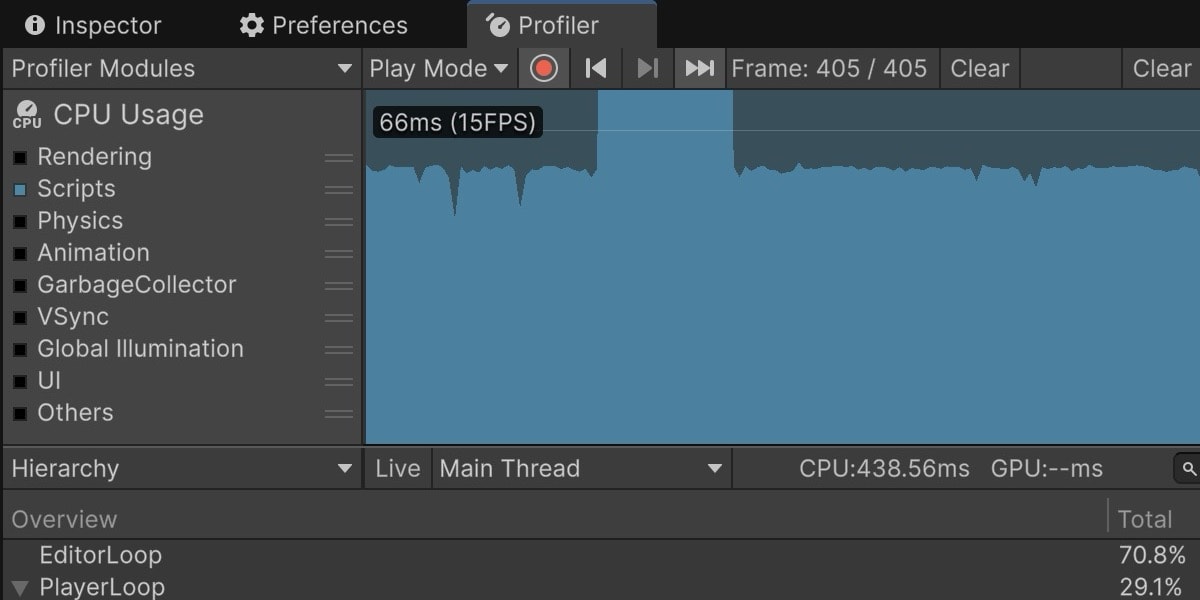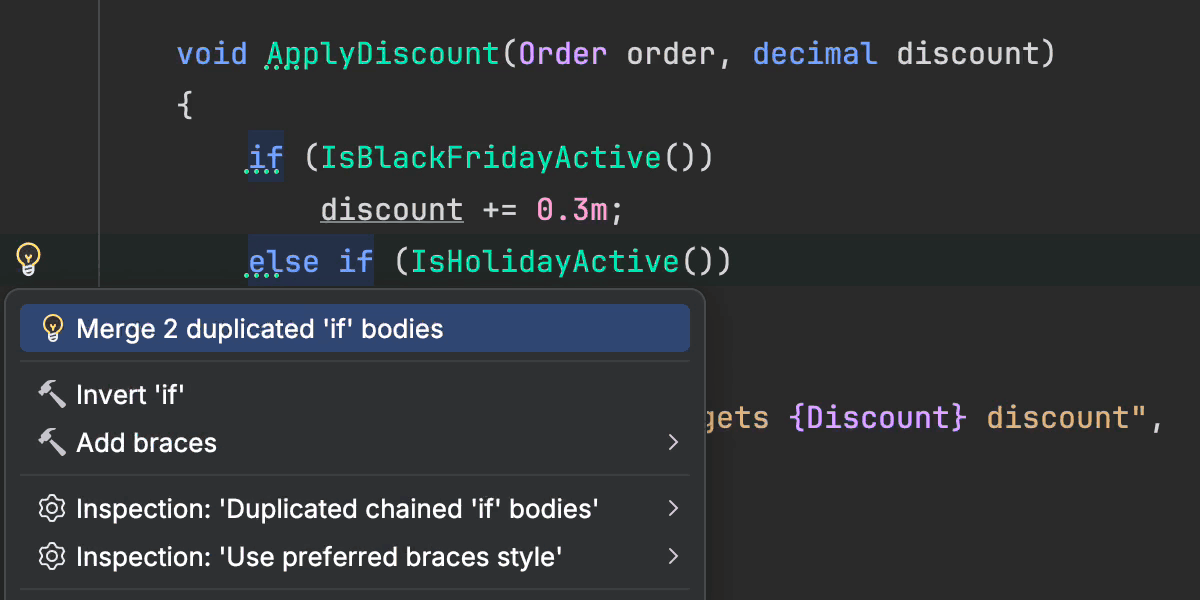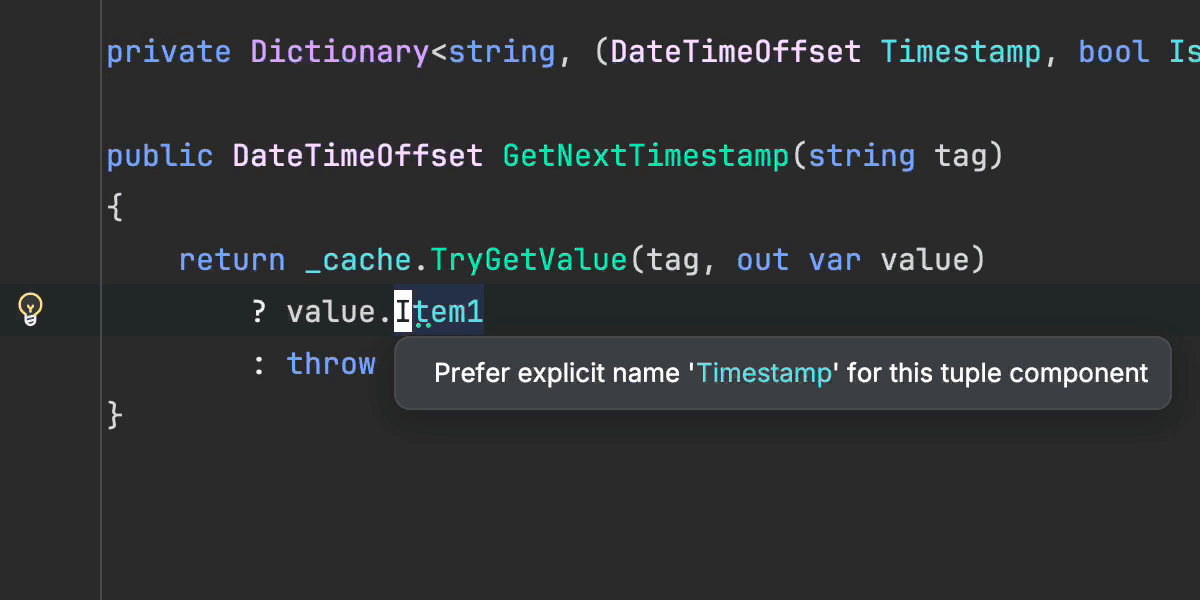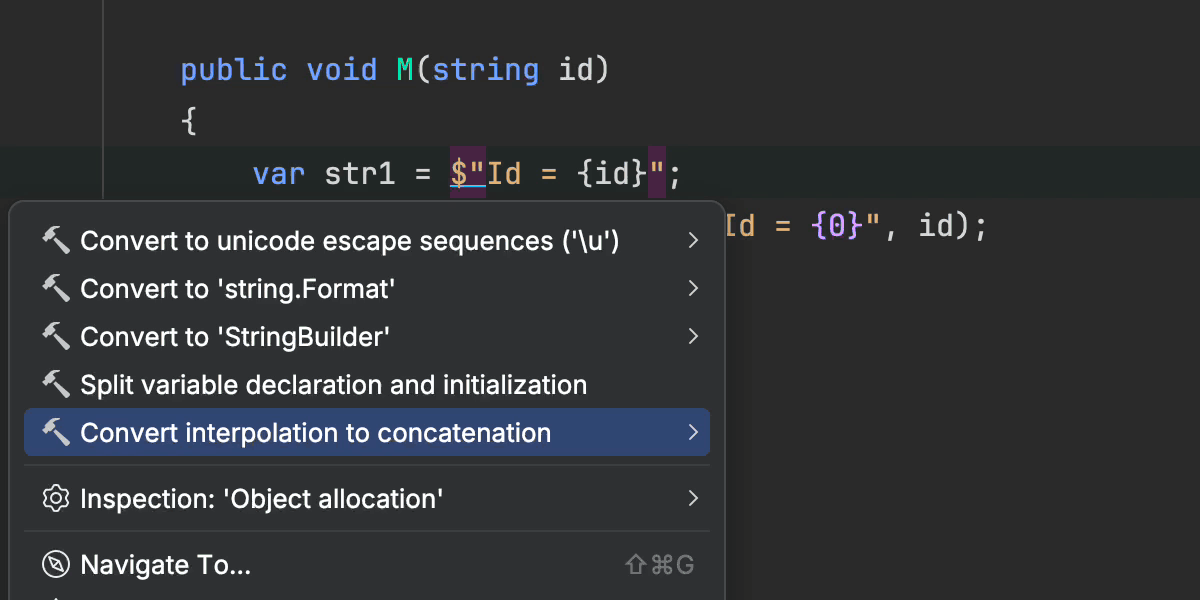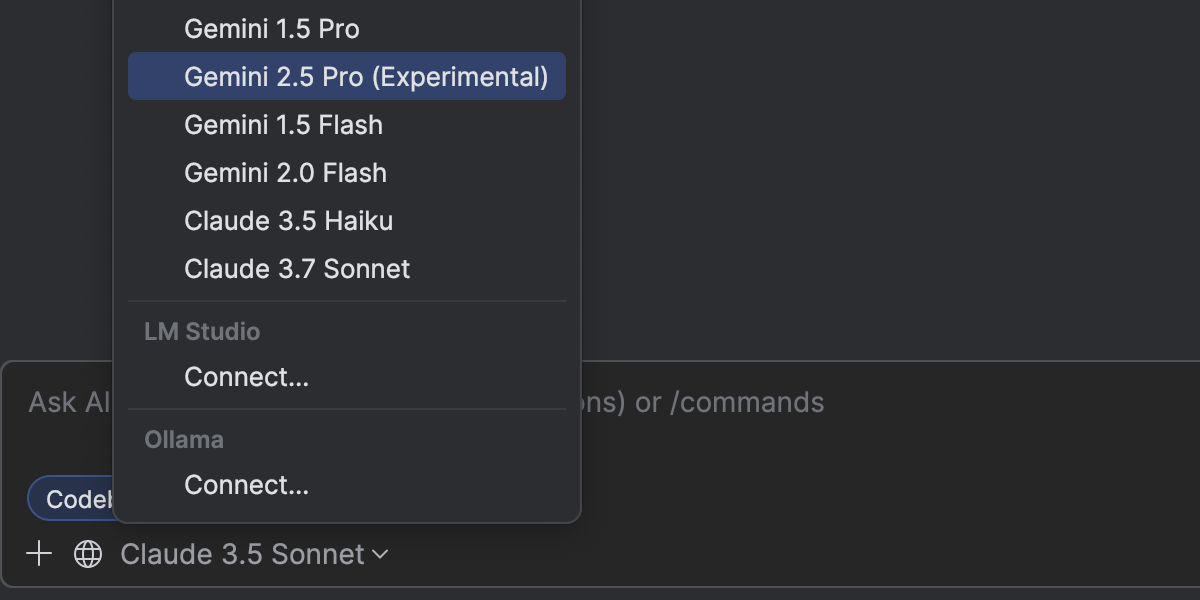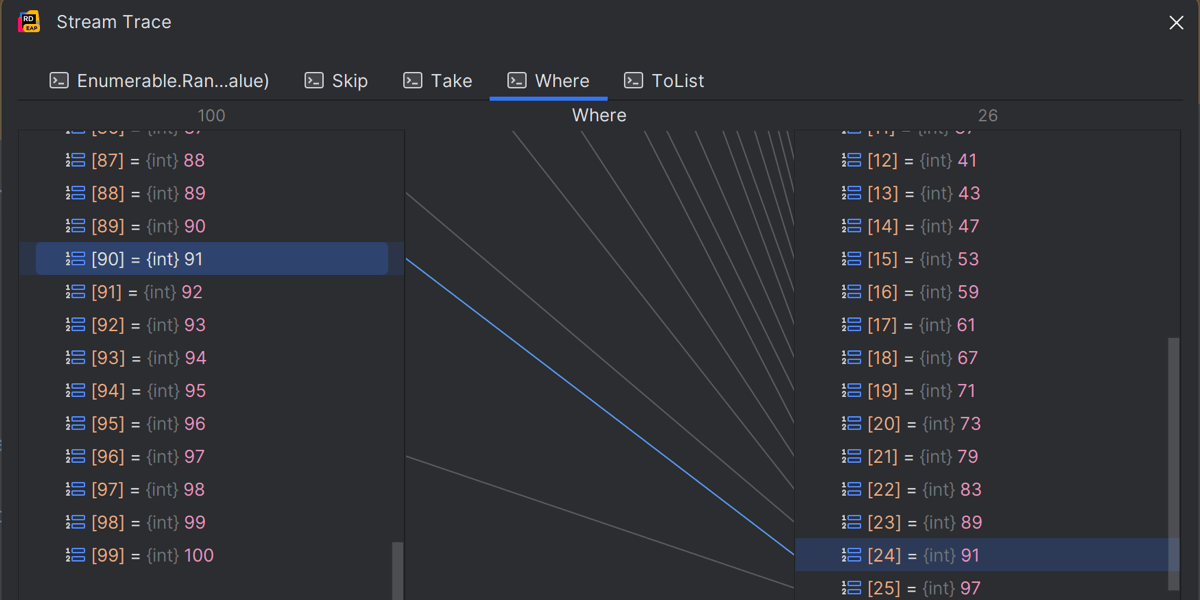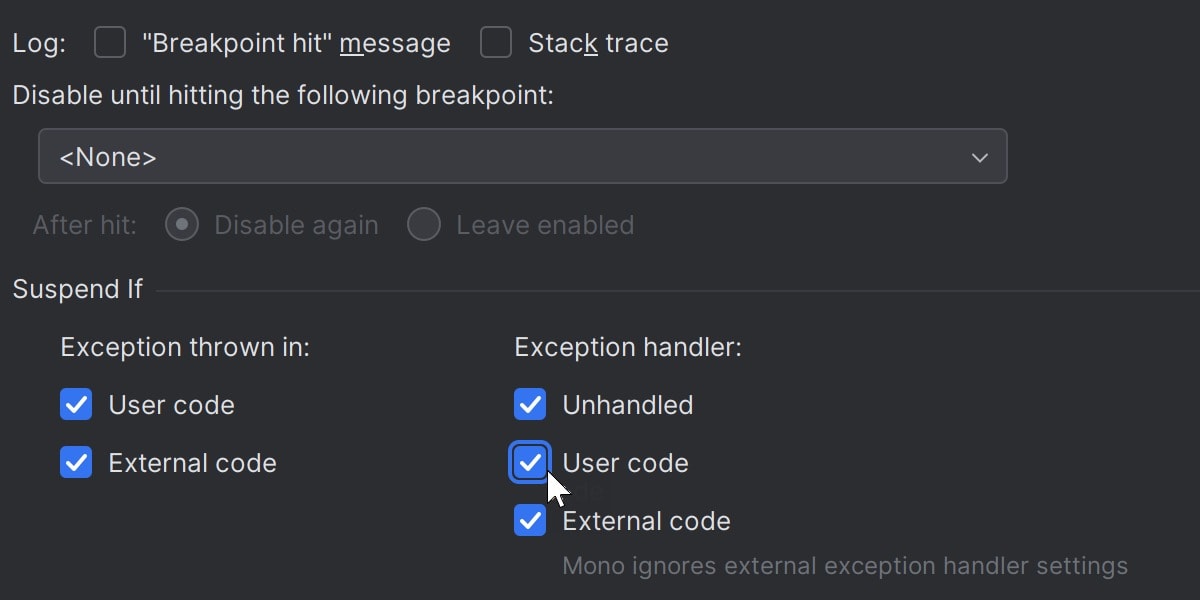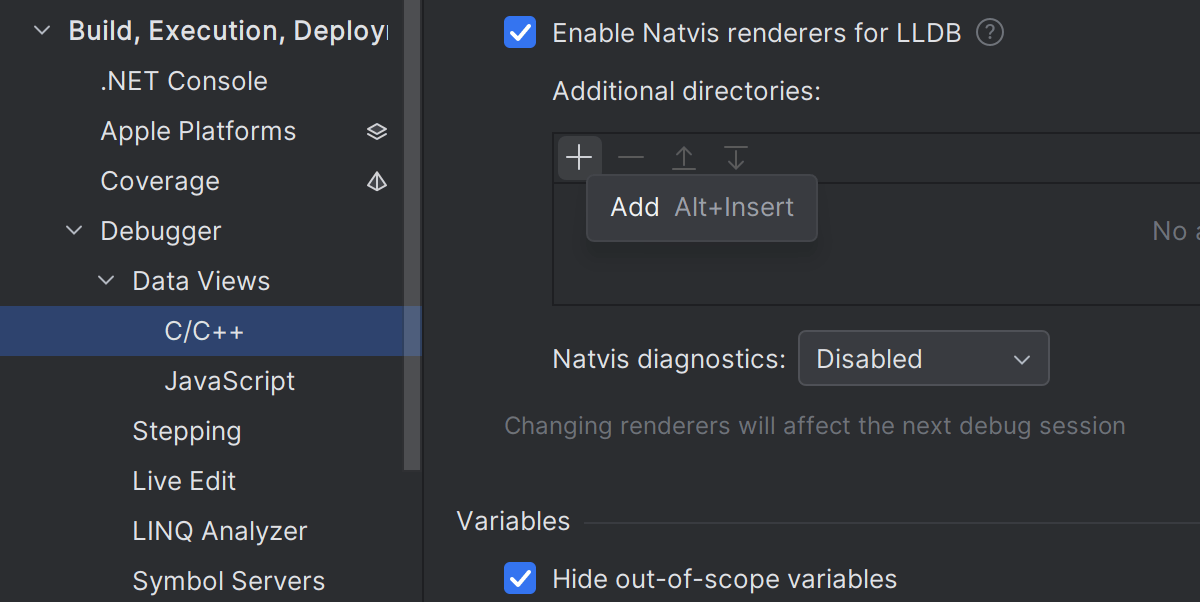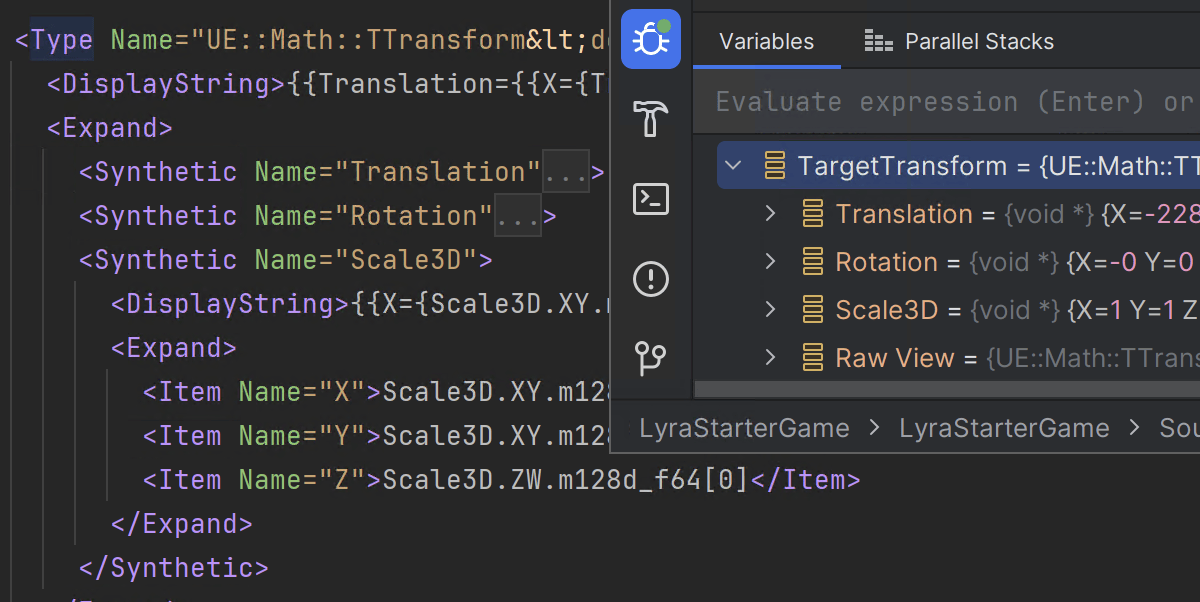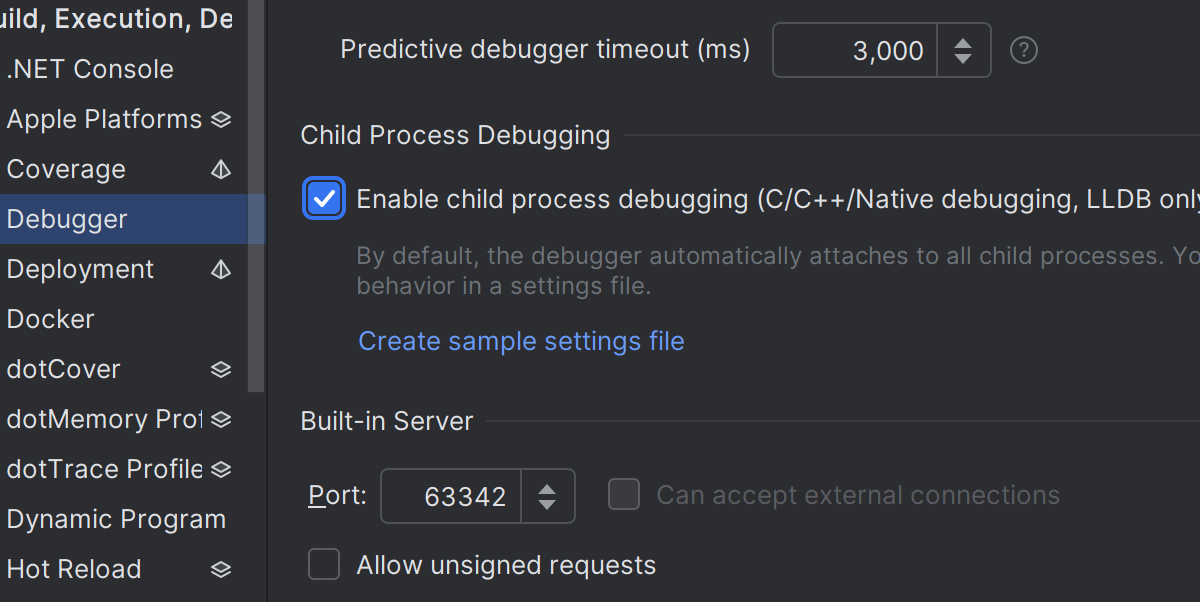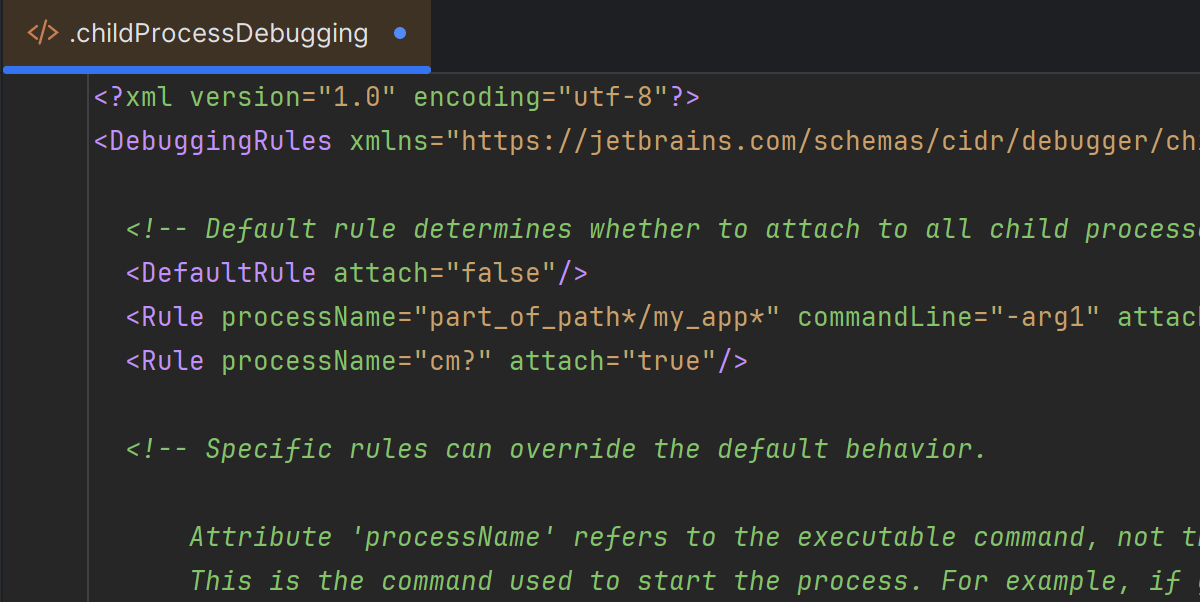Rider 2025.1 の新機能
Rider 2025.1 delivers initial support for .NET 10 and C# 14 preview features. This release introduces the new Files view for repository-wide visibility, a Roslyn syntax tree visualizer, and numerous enhancements for debugging both .NET and C++ solutions. Game developers can leverage the Unity Profiler integration, while AI power users benefit from a fresh selection of newly supported LLMs.
主な更新内容
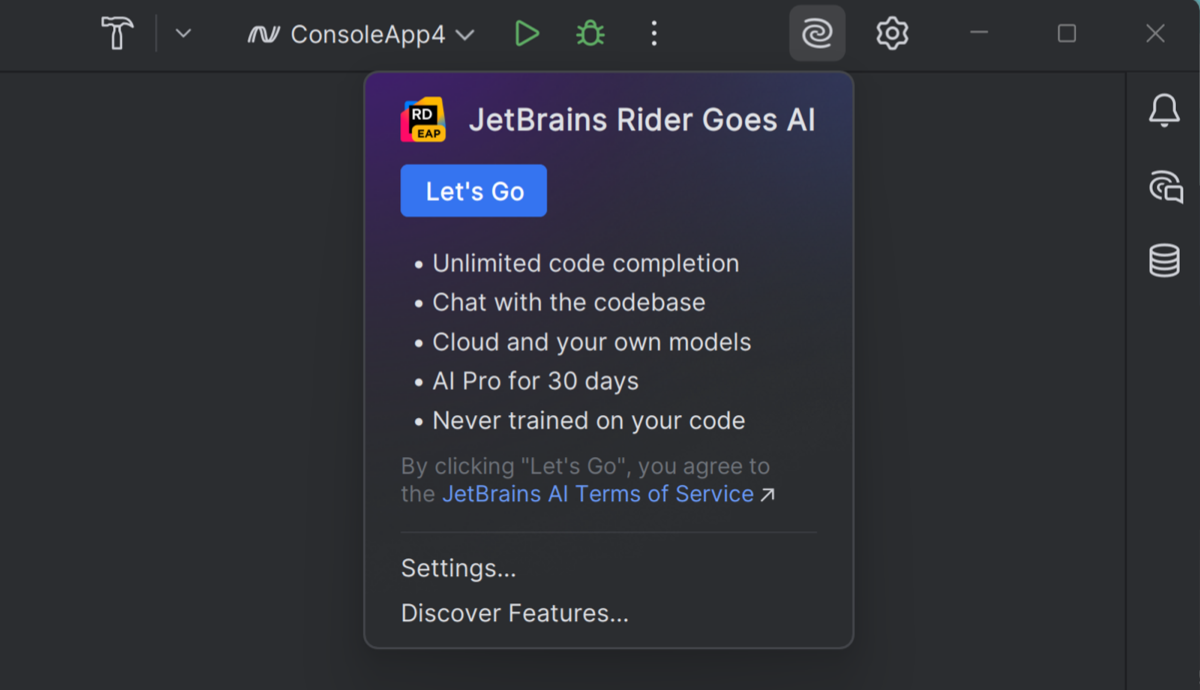
Rider goes AI
JetBrains AI Assistant に大規模なアップグレードが適用され、AI を活用した開発がより親しみやすく効率的なものになりました。 With this release, AI features are now free in JetBrains IDEs, including unlimited code completion, support for local models, and credit-based access to cloud-based features. A new subscription system makes it easy to scale up with AI Pro and AI Ultimate tiers.
This release introduces major enhancements to boost productivity and reduce repetitive work, including smarter code completion, support for new cloud models like GPT-4.1 (сoming soon), Claude 3.7, and Gemini 2.0, advanced RAG-based context awareness, and a new Edit mode for multi-file edits directly from chat.
Repository-wide visibility in the Solution Explorer
Navigate your entire codebase with Rider's new Files view. This redesigned view lives alongside your Solution view. Files(ファイル)ビューにはルート以下のリポジトリ全体の構造が表示されるため、フルスタックプロジェクト、構成ファイル、およびモダンな開発環境を構成するすべての項目をより簡単に扱えるようになります。 To enable repository-wide visibility, select New Files View in the Solution Explorer tool window settings.
Roslyn syntax tree visualizer
You can now view and explore C# syntax trees directly inside the IDE with Rider's new Roslyn syntax tree visualizer. The visualizer provides real-time tree visualization that stays synchronized with your editor.
You can interactively explore nodes and inspect their properties, quickly navigate between code and corresponding tree nodes, and use comprehensive search and filtering capabilities. 詳細はこちらをご覧ください。
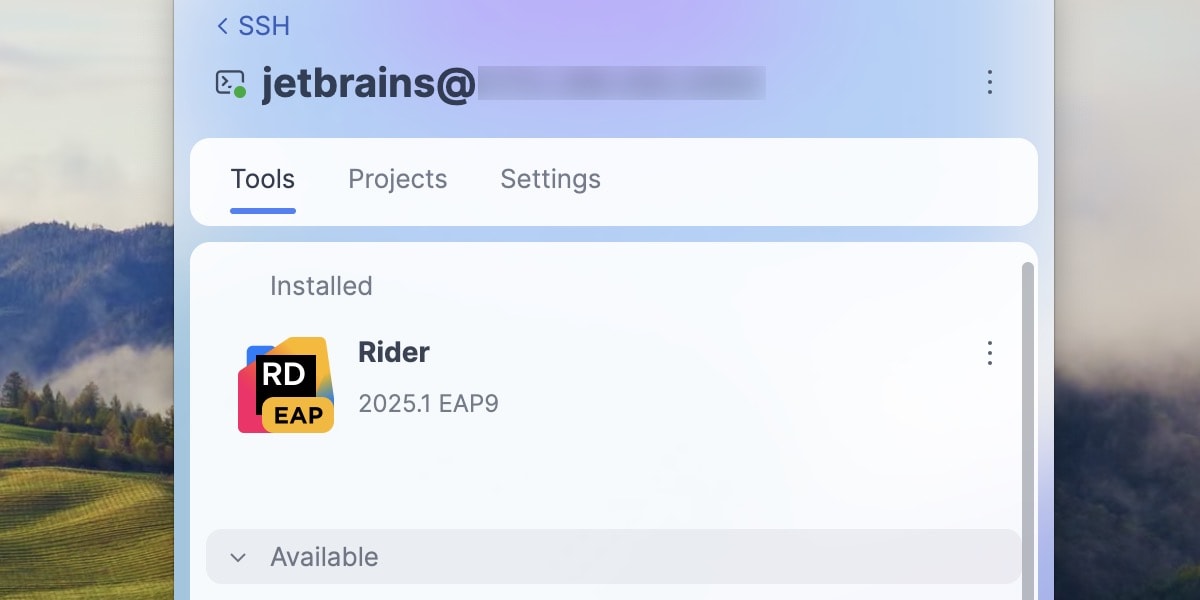
Windows ホストマシンでのリモート開発
Starting with Rider 2025.1, remote development on Windows hosts is now supported via the JetBrains Toolbox App. Gateway は依然として Linux 接続に使用できますが、リモート開発の主なハブを Toolbox App に完全に移行する計画が進んでいるところです。 JetBrains Toolbox App を使用して Windows、macOS、Linux ホストマシンに接続する方法については、こちらのブログ記事をご覧ください。
Unity Profiler integration Game development
Rider now integrates with the Unity Profiler, bringing CPU performance insights directly into your editor. The IDE fetches CPU usage snapshots and displays them inline with your code, making it easy to spot performance hotspots as you write and debug your Unity scripts. Unity Profiler の階層ビュー内の呼び出しから Rider 内の対応するメソッドにシームレスに移動できます。
.NET 10 Preview SDK のサポート
- 新しい SDK のプロジェクトテンプレートのサポート。
- 新しい SDK をターゲットにしたプロジェクトを作成、実行、デバッグする機能。
- C# 14 と VB 17.13 の最新プレビュー機能の初期サポート。
コード解析
新しいインスペクションとクイックフィックス
このリリースでは、以下を含むさまざまな C# バージョンにおける一般的なミスや非効率性を対象とする新しいインスペクションもいくつか追加されています。
- 文字列補間を連結に変換する新しいコンテキストアクション
- 強化されたコード重複パターンの検出
- 改善されたタプルコンポーネント名の提案
For information on these and other improvements to code analysis, please see What's New in ReSharper 2025.1.
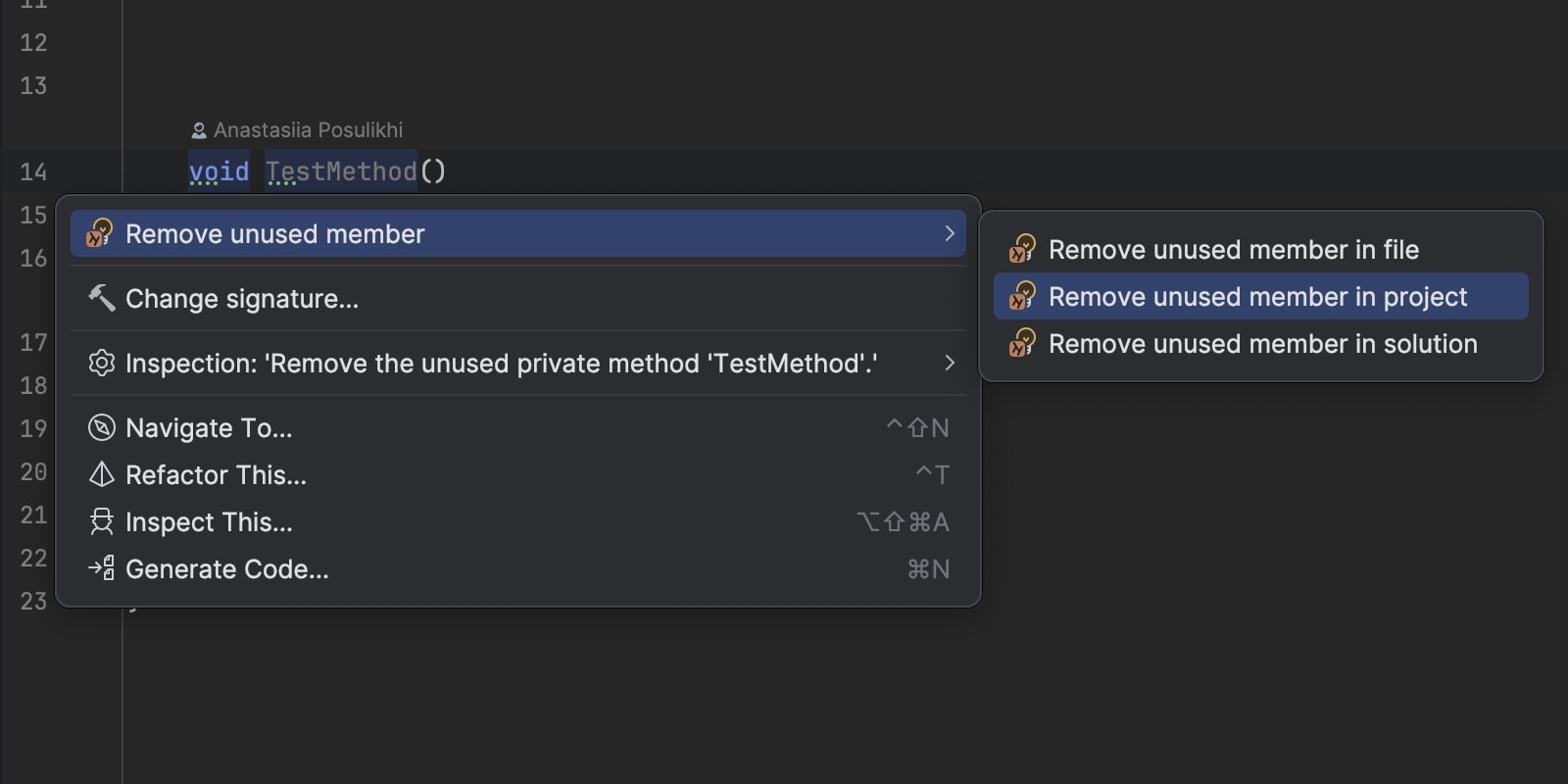
Scoped quick-fixes for Roslyn analyzers
Rider 2025.1 introduces scoped quick-fixes for Roslyn analyzers, allowing you to apply fixes at the file, project, or solution level in a single action. Now, instead of repeatedly applying the same fix, you can select the scope – whether a single file, an entire project, or the full solution – directly from the quick-fix menu.
C#14
Rider 2025.1 brings initial support for .NET 10 and C# 14 preview features, helping you stay ahead of the curve with the latest language enhancements.
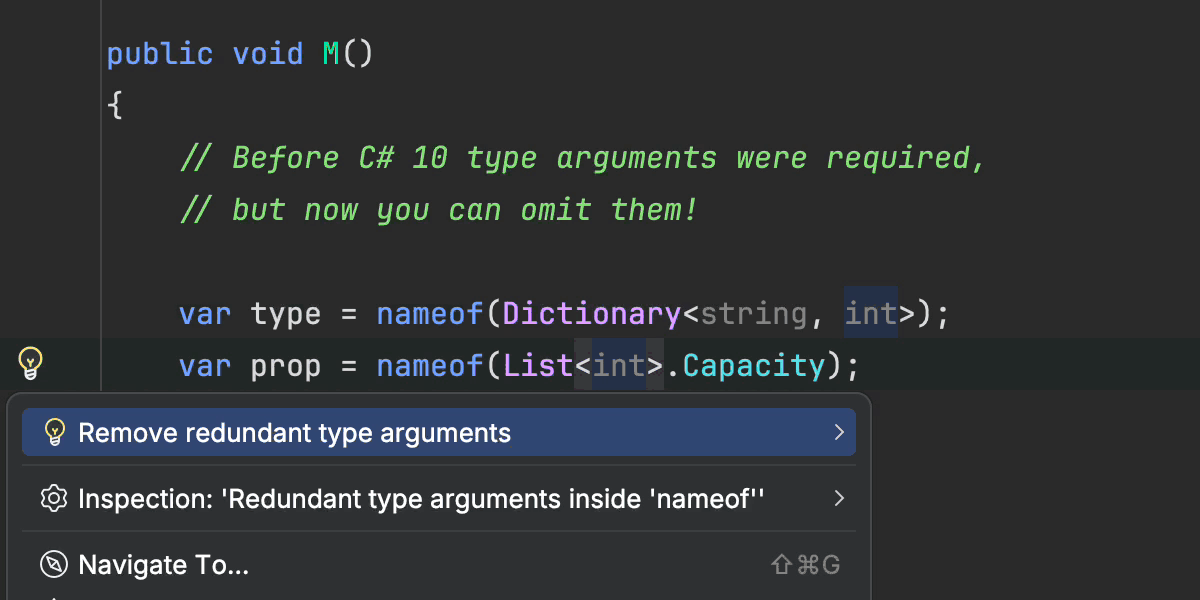
バインドされていないジェネリック型の nameof
Previously, using nameof required specifying all type arguments, causing unnecessary verbosity. C# 14 allows nameof(List<>) without explicitly listing type arguments. Rider now detects redundant generic type arguments in nameof expressions and provides a quick- fix to simplify them.
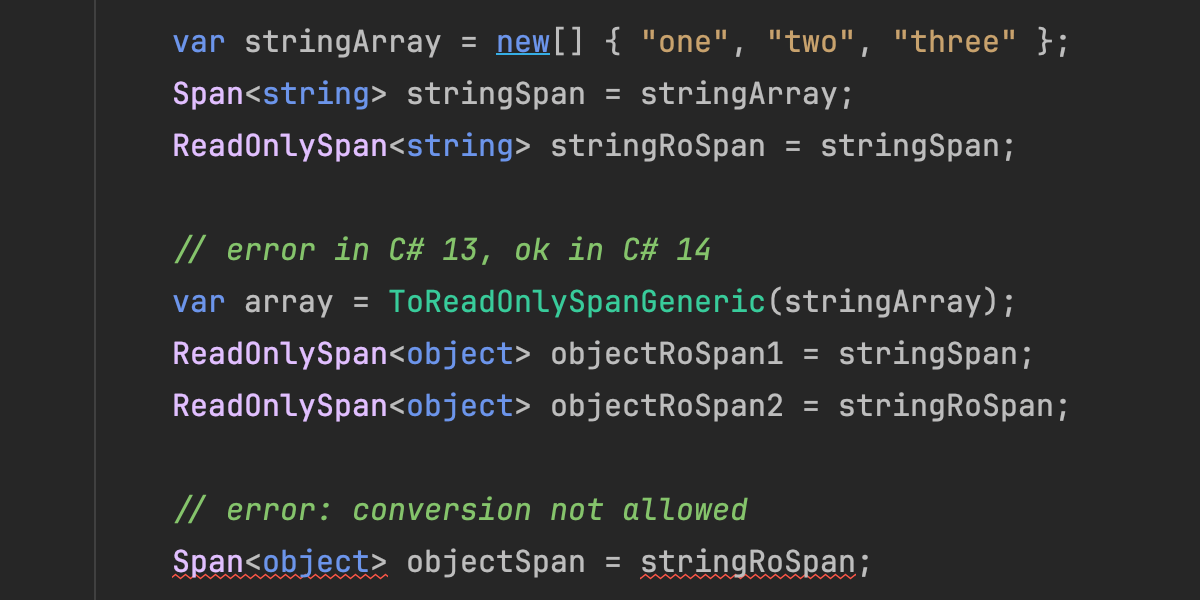
ファーストクラスの Span<T> 変換
C# 14 introduces new implicit conversions between ReadOnlySpan<T>, Span<T>, and T[], making span-based code more intuitive. Rider now fully supports these conversion rules, helping you write efficient, modern C# code.
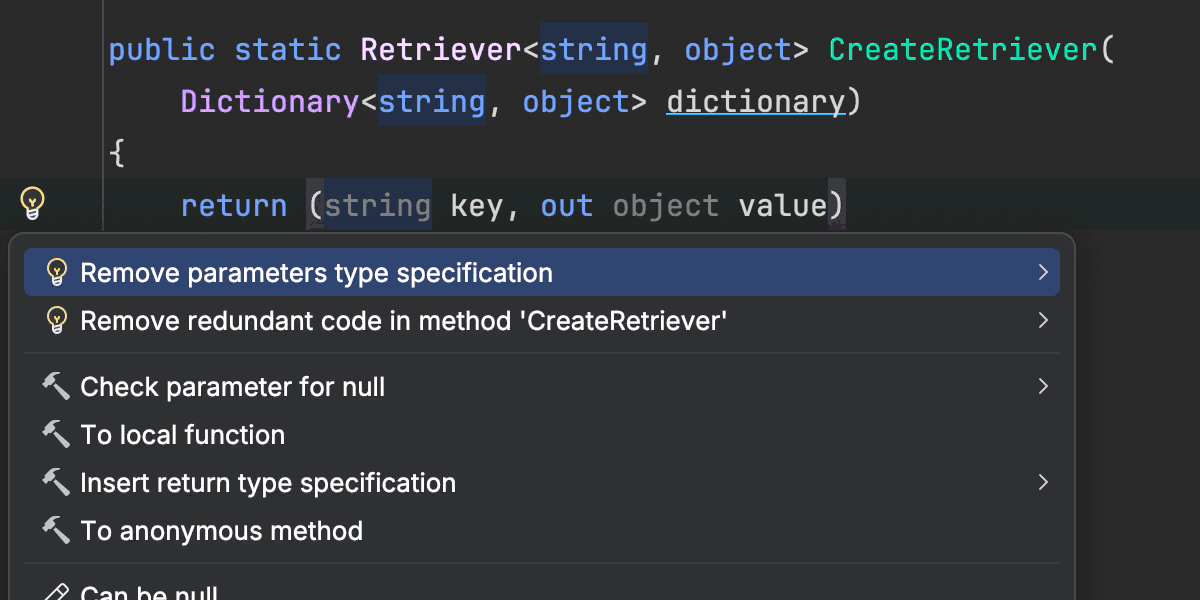
単純なラムダパラメーターの修飾子
With C# 14, you can now use parameter modifiers like ref, out, in, and scoped in lambda expressions without needing explicit parameter types. Rider offers a quick- fix to remove redundant type specifications.
Learn all about the improvements to C# language support in Rider and ReSharper on our blog.
F# のサポート
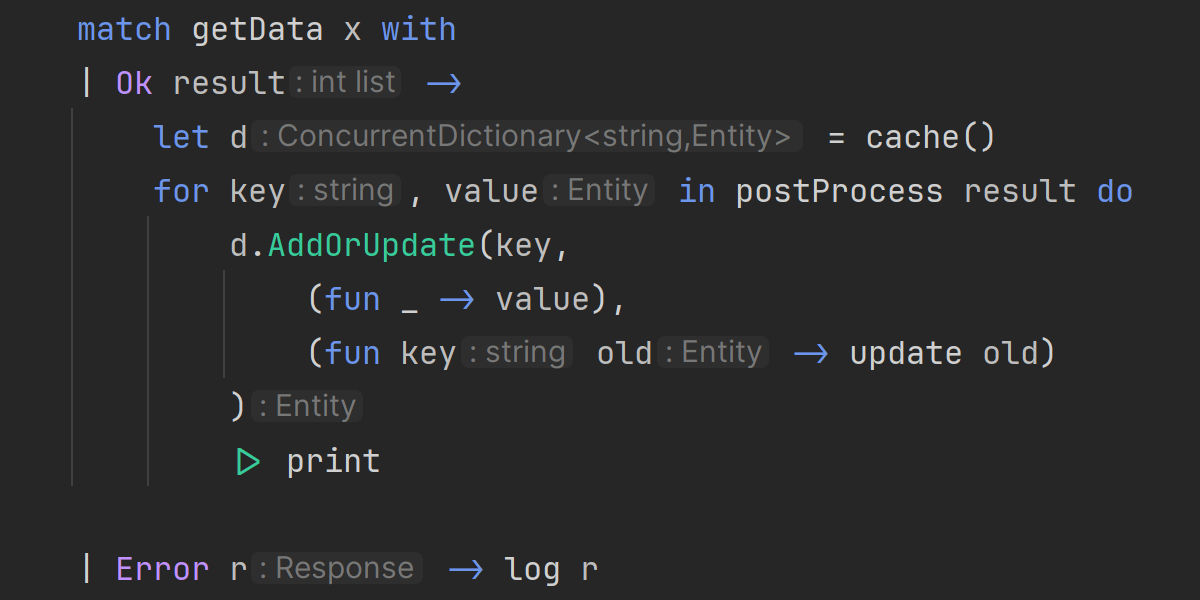
型ヒント
Inferred types are now shown for more patterns, improving clarity when working with match expressions and other pattern-using constructs.
コード補完
We've rewritten various parts of F# code completion, so it now works faster, uses less memory, and provides more accurate suggestions.
C# in-memory references
We've optimized building metadata, fixed issues leading to inconsistent analysis and freezes, and improved cancellation for better code editing performance.
F# のサポートに関するその他のバグ修正と改善点については、こちらをご覧ください。
ユーザーエクスペリエンス
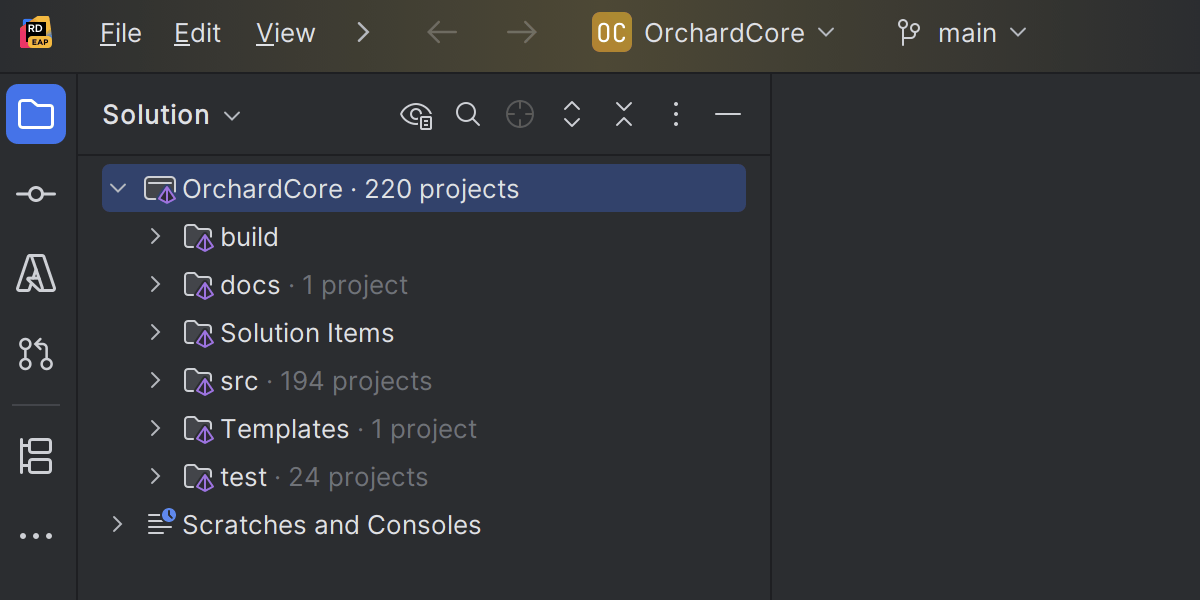
メインツールバーにメインメニューをマージ(Windows および Linux)
Windows および Linux ユーザー向けの IDE に、メインツールバーにメインメニューをマージする新しいオプションが備わりました。このオプションにより、インターフェースがさらに合理化されました。
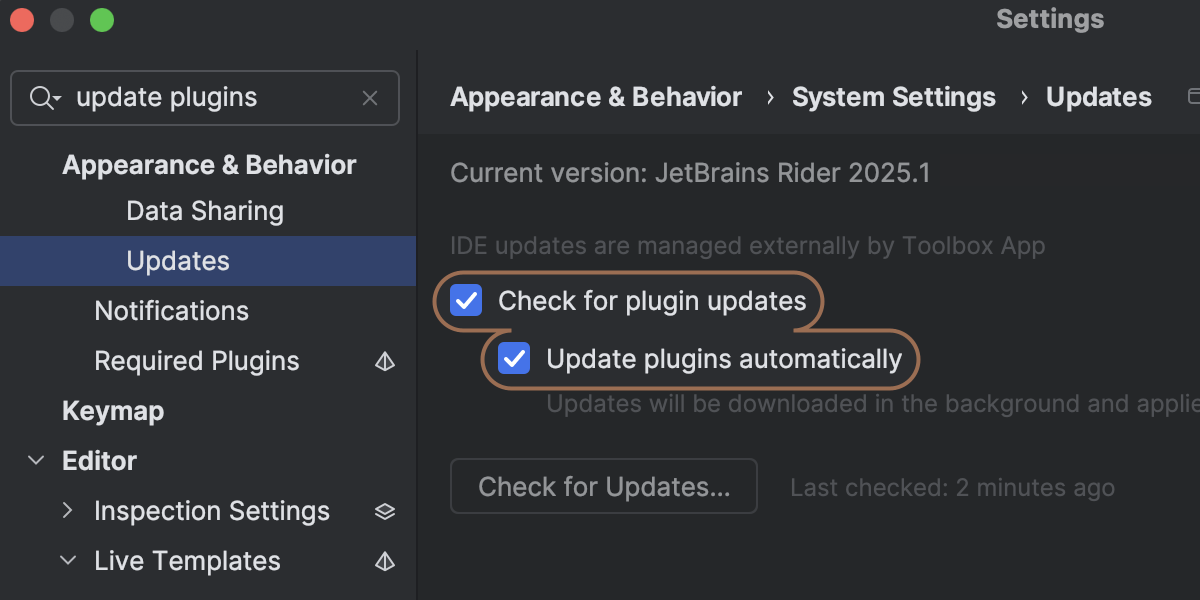
プラグインの自動更新を設定するオプション
You can set Rider to automatically update plugins in the background. It will download all available and compatible updates and apply them the next time the IDE is restarted without additional notifications.
パフォーマンス
Memory consumption
For this release, we've completely overhauled our string interning system. IDEs process an enormous number of strings, including source code, syntax elements, symbol names, and file paths, so efficient string handling is critical. Our new string interning system stores, on average, four times as many unique strings as its previous iteration and consumes about half as much memory to do so, freeing up resources in large-scale .NET projects.
Blazor と Razor の改善
Razor tag helpers and Blazor component support have been completely rebuilt for 2025.1. This long-needed overhaul brings a 5%–10% reduction in analysis time for large ASP.NET solutions with heavy component usage. You'll also experience fewer reanalysis events when editing .cshtml/.razor files, as well as significantly reduced false error reporting.
AI Assistant
ウェブフレームワークの AI 補完の改善
For the 2025.1 release we have focused on improving AI-based completion in the context of web framework components. These changes affect local full line code completion as well as cloud-based completion suggestions.
Consistent Naming for AI-Generated Unit Tests
Rider now ensures that AI-generated unit tests follow existing naming conventions in your project. This improvement helps maintain consistency across your test suite, reducing the need for manual renaming and making test integration smoother and more intuitive.
最先端 LLM の追加サポート
JetBrains AI Assistant is advancing its line of models! We've added support for Claude 3.7 Sonnet and Claude 3.5 Haiku, now provisioned in Amazon Bedrock. This means you'll benefit from sharper responses, faster insights, and an even smoother experience. AI Assistant's lineup of OpenAI models now includes o1, o1-mini, and o3-mini.
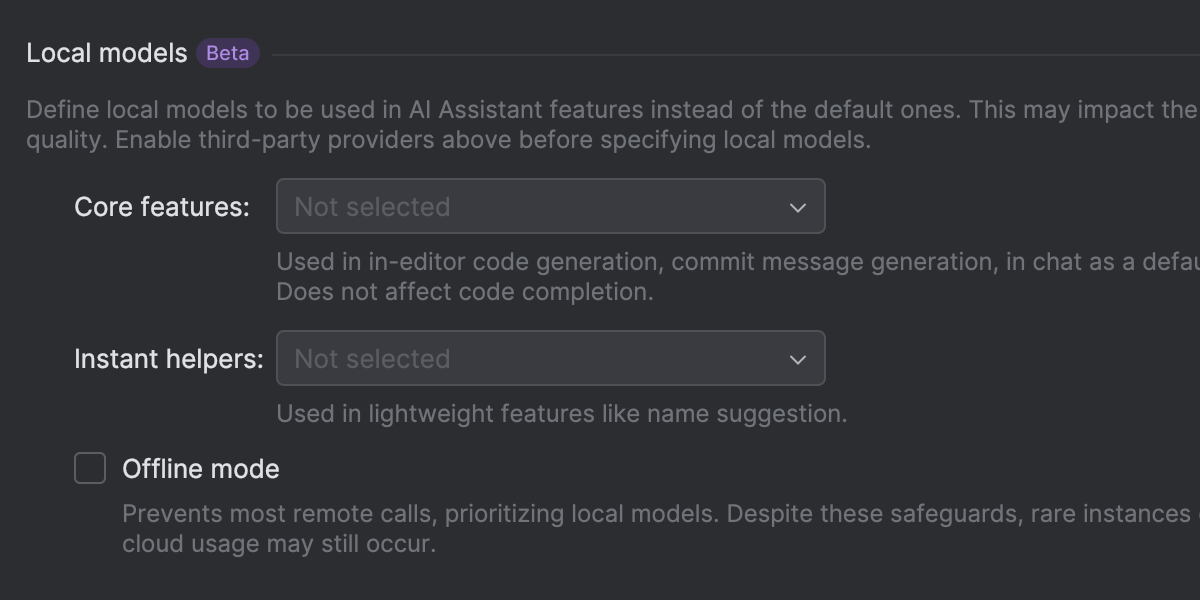
Offline mode: work with local models
AI Assistant では、オフラインモードでローカルモデルを使用するか、クラウドベースの AI 処理を使用するかを柔軟に選択できます。 Now it supports Offline mode, allowing you to work without an internet connection while still benefiting from AI-powered coding assistance. Ollama または LM Studio によるローカルモデルをチャット、コード生成、コミットメッセージ、インラインドキュメントなどで使用できます。
Learn more about the AI Assistant features from this page.
デバッガー
.NET
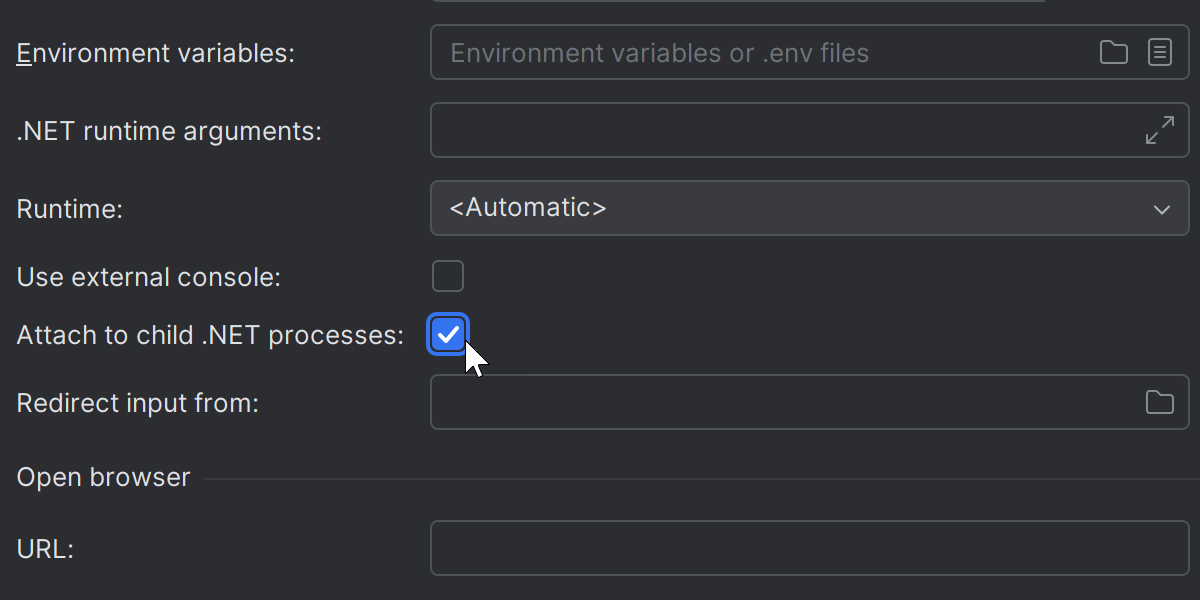
Automatic child processes attachment
Rider now offers automatic attachment to child and grandchild processes during .NET application debugging. When enabled in the run/debug configurations, the IDE tracks and attaches to all .NET processes spawned within the application's process tree.
Enable this feature using the new Attach to child .NET processes checkbox.
LINQ chain debugging
Rider 2025.1 comes with improved data visualization for LINQ expressions, making it easier for you to understand and debug complex LINQ queries directly in the debugger. You'll now be able to inspect query execution, see intermediate results, and better understand how your LINQ operations transform the data. For more information, please see documentation for this feature.
Enhanced exception breakpoint configuration
Rider 2025.1 introduces new breakpoint setup options that allow you to configure exception breakpoints with greater precision. Now, you can:
- Suspend based on where the exception is thrown (User code or External code).
- Filter breakpoints by exception handlers (Unhandled, User code, or External code).
C++
Rider 2025.1 comes with lots of updates for C++ debugging, which might be particularly useful for Unreal Engine development. Click here to see what's new.
Run/debug
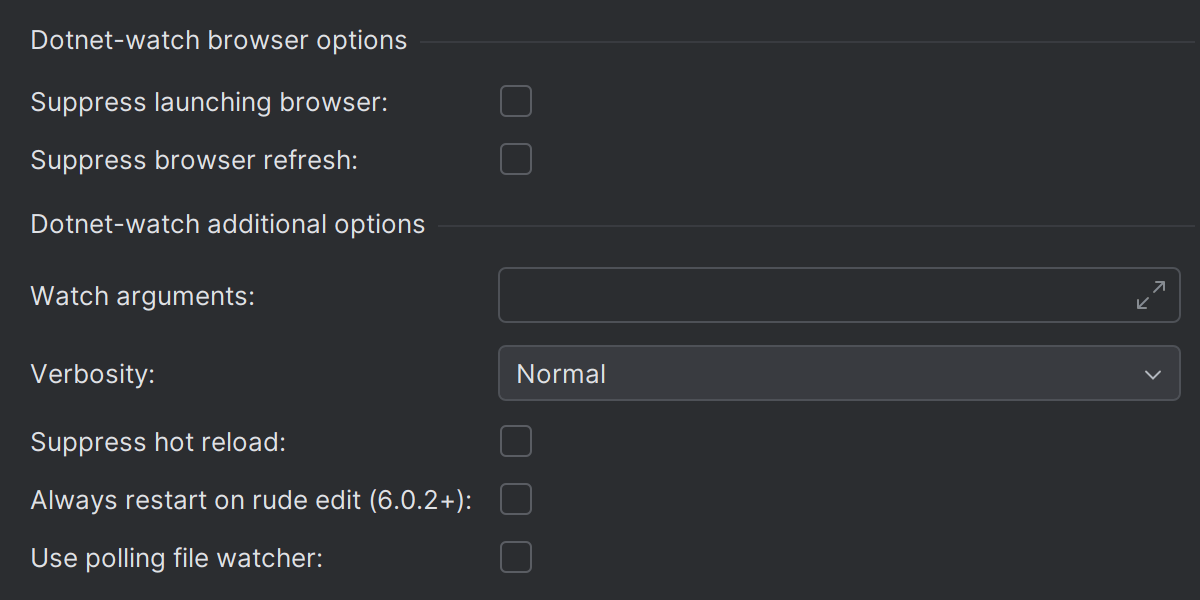
Support for dotnet watch as a run/debug configuration
Rider 2025.1 introduces a dedicated run and debug configuration for dotnet watch, streamlining the development workflow for projects that need automatic rebuilding and restarting as code changes.
This enhancement particularly benefits ASP.NET Core and .NET developers, as it continuously builds your application when you modify .cs, .html, or .css files. The feature also extends to test files, enabling automatic test execution whenever your code changes.
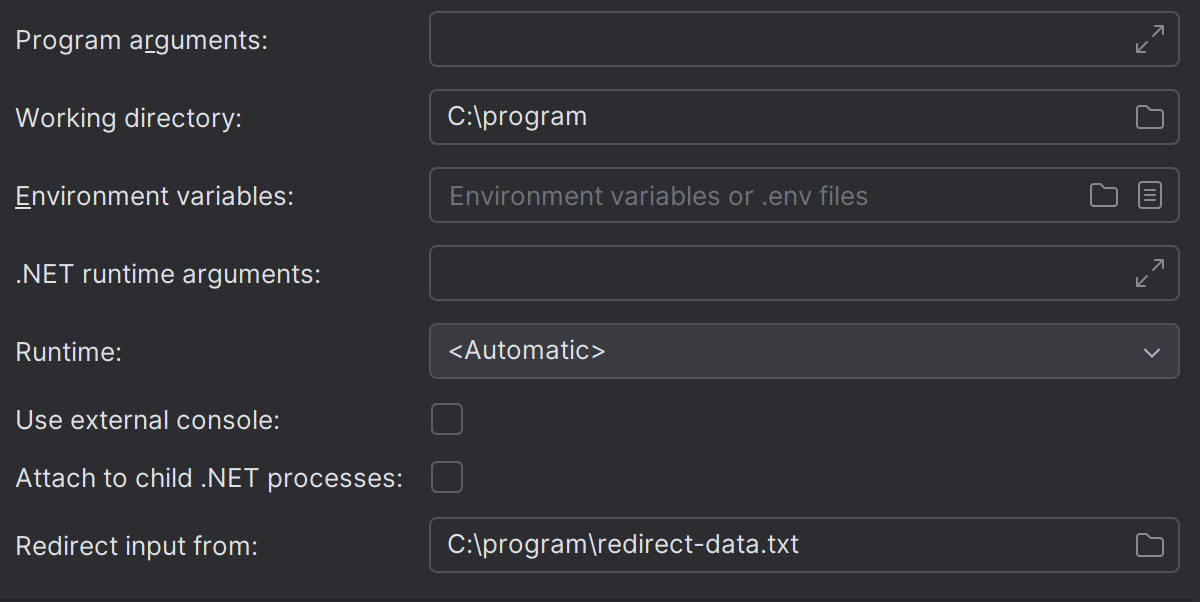
Input/output redirection for run configurations
Input and output redirection for run configurations is available in Rider 2025.1. You can now easily specify a file to be used as standard input (stdin) and direct program output to a file, streamlining debugging and testing workflows.
Additionally, you can now attach log files to a run configuration. These files will then be shown in separate tabs in the Run or Debug tool windows during program execution.
Easier environment variable configuration with .env files
Rider 2025.1 simplifies the management of environment variables. Instead of manually entering variables, you can now use .env files directly in your run/debug configurations. Look for the folder icon (Browse) next to the Environment Variables field to attach your .env files. Rider will load them on the next launch. You can even use multiple files across different projects to maintain consistent configurations.
バージョン管理システム
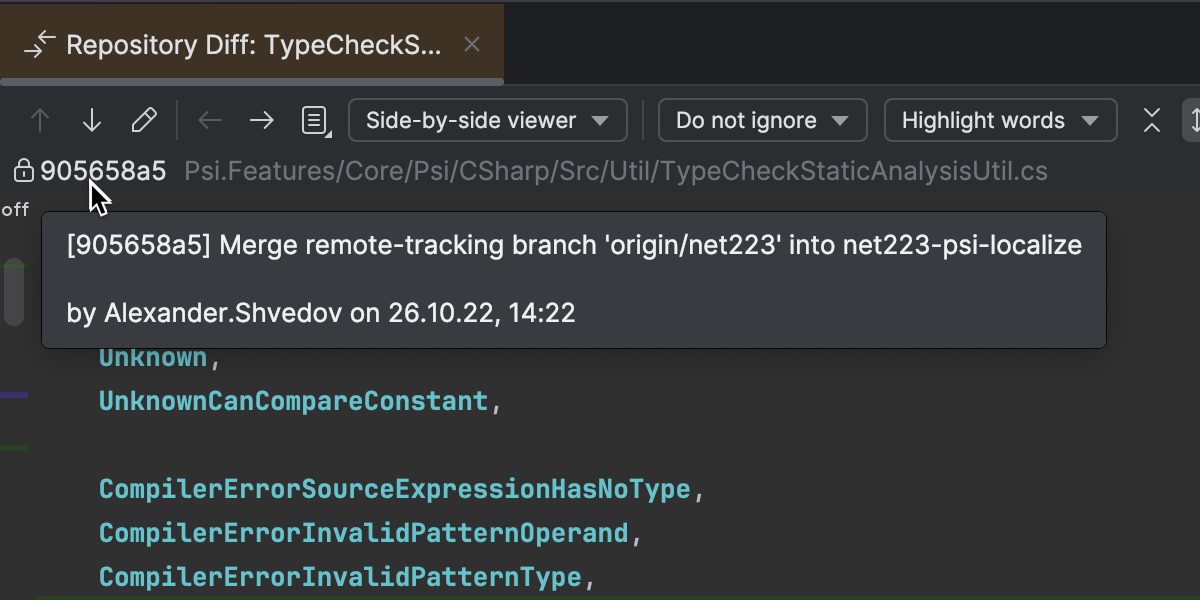
Diff ペインにコミットの詳細を表示
コミットの詳細を Diff ペインに直接表示できるようになりました。 The diff dialog now displays the commit message, author, date and time, and full commit hash, giving you a clearer view of a file's history and helping you understand modifications faster.
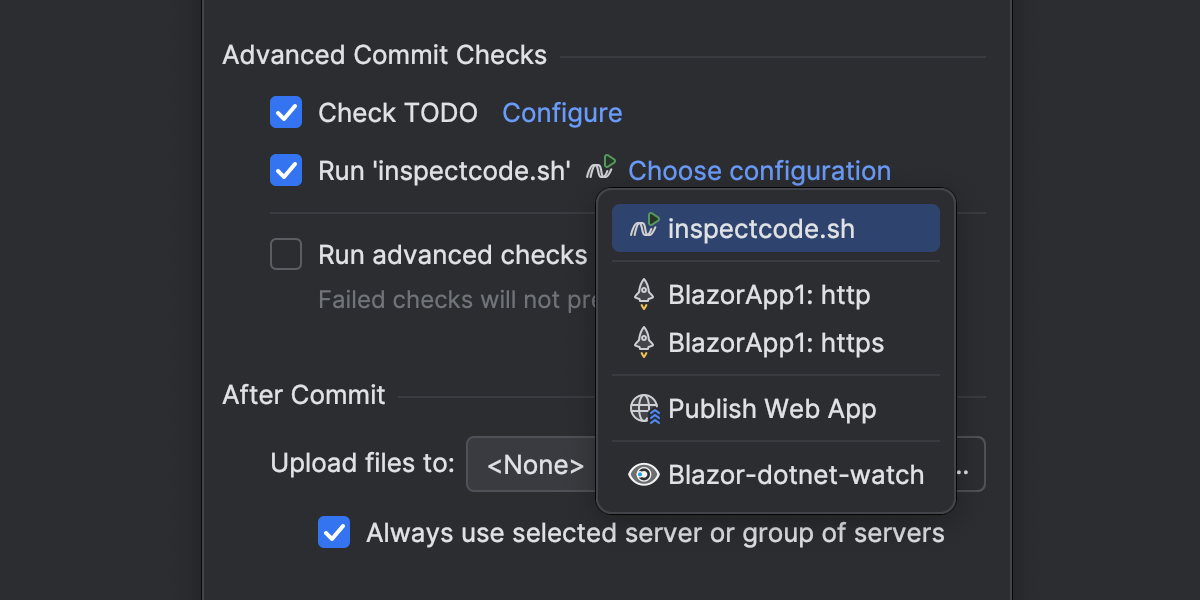
コミット前チェック用のツールを実行するオプション
インスペクションと整形に加えて、コミット前チェックを実行する任意のツールを起動できるようになりました。 カスタムチェックは Run Configuration(実行構成)ダイアログで実行構成として構成できます。 これにより、潜在的な問題を早期に検出し、コードをコミットする前にプロジェクトの標準を満たしているかどうかを確認することができます。
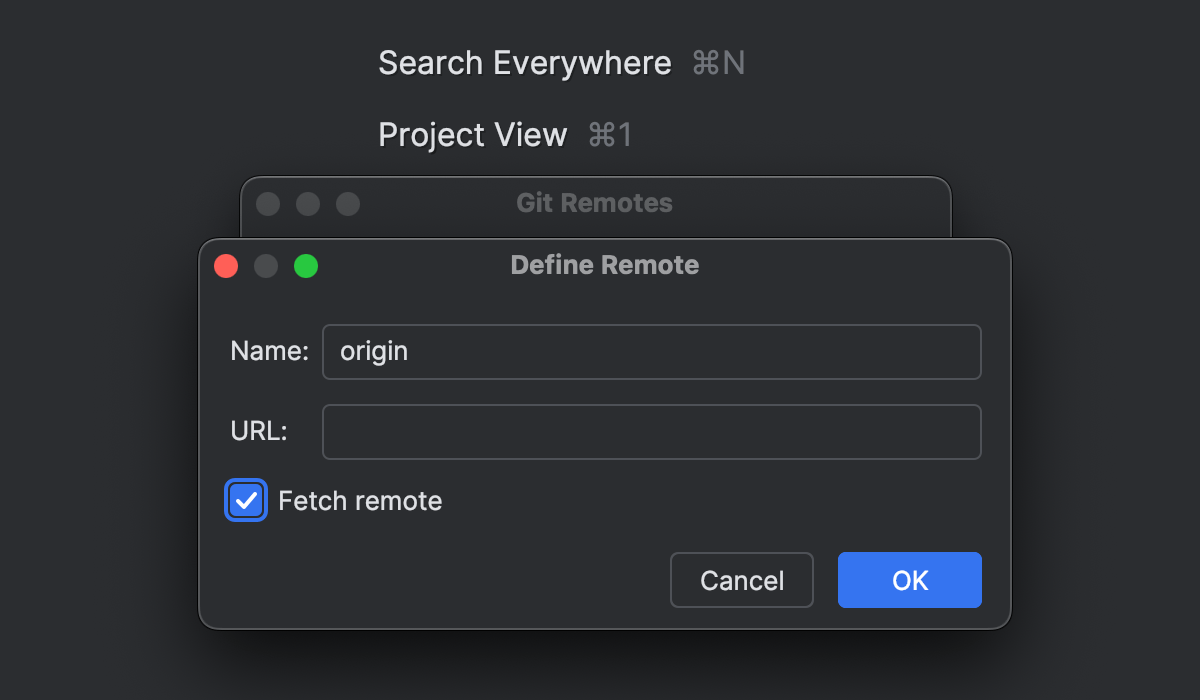
Git リモートの追加または変更時の自動取得
Rider now automatically fetches changes when you add or update a Git remote, ensuring you always have the latest branch list and commit history without needing to fetch them manually. 新たに取得されたブランチは、Git ブランチツリーに即座に表示されます。 これらのブランチでの作業はすぐに開始でき、リポジトリは常に最新の状態が維持されます。
For more information on VCS updates, please see this page.
ゲーム開発
NoesisGUI フレームワークのサポート
We've added support for the NoesisGUI framework for both Unreal Engine and Unity projects.
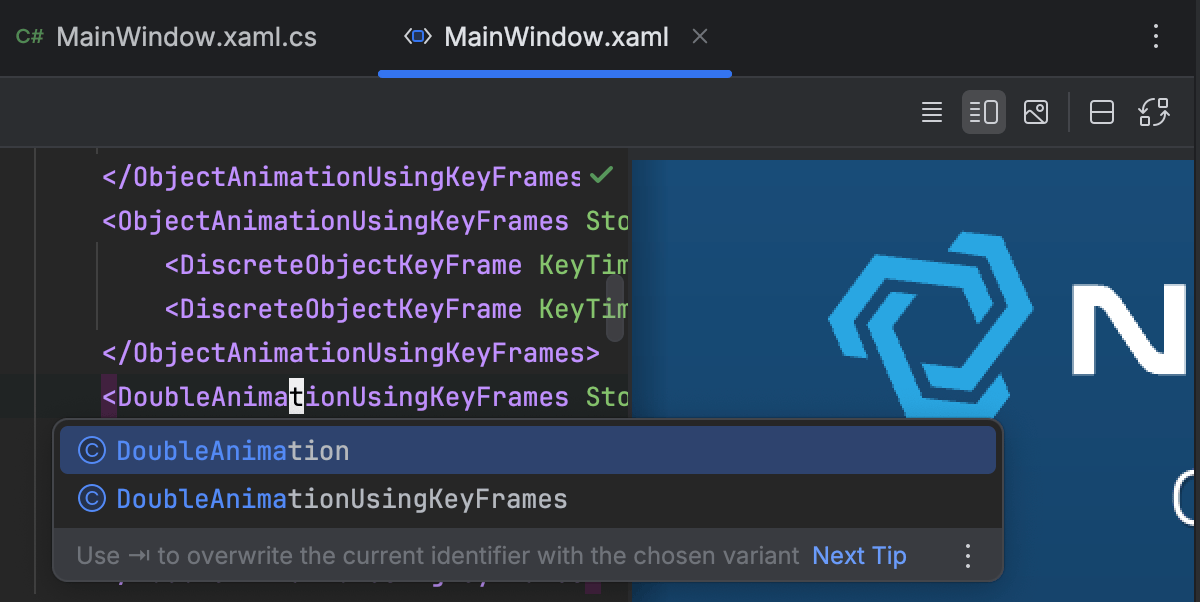
Rider will use the NoesisGUI language server for code completion of XAML elements and binding expressions, as well as for highlighting errors and displaying error description tooltips. Rider は XAML ファイルで記述されたインターフェースのプレビューも提供します。
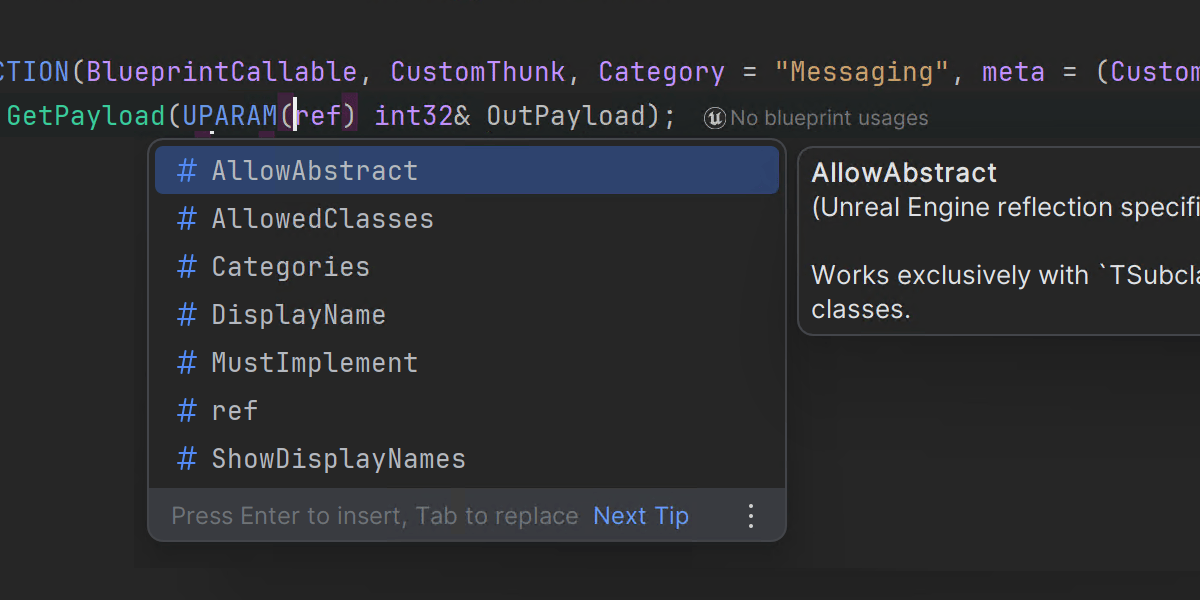
Unreal Engine
While our main focus for this release was on the debugger, we still had time to work on several Unreal Engine-related updates and fixes, such as for the issue causing Rider not to run unit tests created from the ComplexTest template. Rider が UMETA および UPARAM リフレクションマクロを認識してハイライトし、これらのマクロとその属性に対するコード補完とツールチップドキュメントを提供するようになりました。
We've also been working on optimizations for Blueprint indexing. We've reduced memory usage and made more parts of the process run asynchronously on a background thread. This should result in a more responsive experience while Rider indexes your Blueprints the first time a solution opens.
デバッガー
We've implemented many useful updates for the native debugger in this release, including significant performance improvements that make stepping in very large projects up to 50 times faster! You can find more details in this blog post.
Rider's support for Natvis files has been improved. Now, Natvis files are automatically loaded from the AppData folder, and there is a new option to specify custom locations containing more files.
Rider will now recognize synthetic items in Natvis files, which means the debugger will show additional nodes when displaying the contents of a type.
The debugger can now automatically attach to child processes, and custom rules can be applied to specify which child processes it should attach to or ignore.
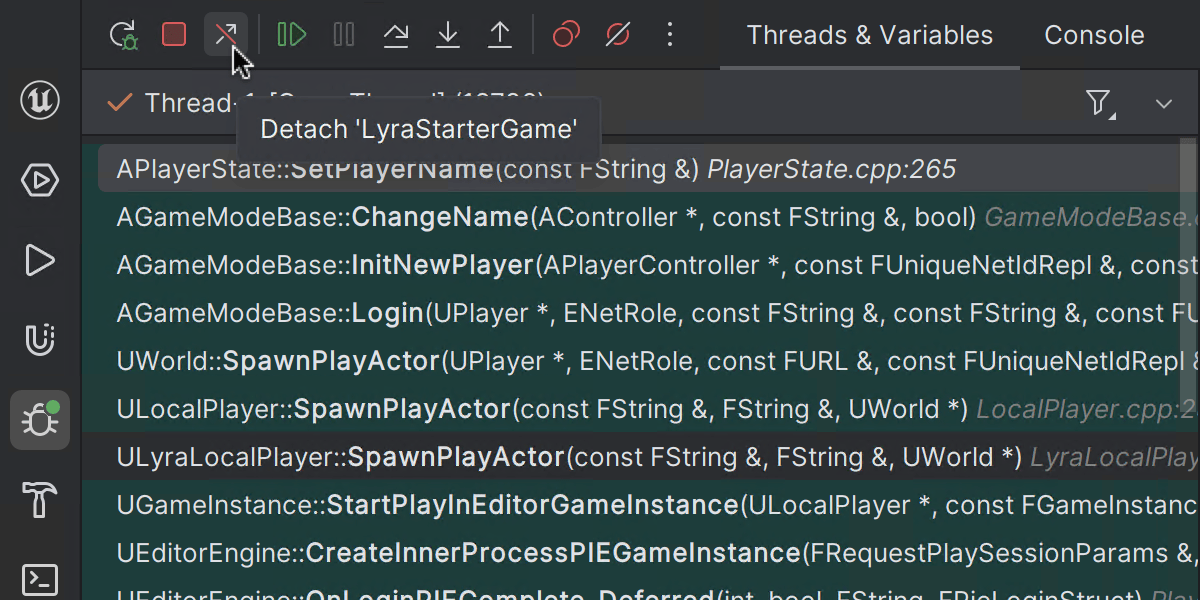
The Detach process action now works with native applications.
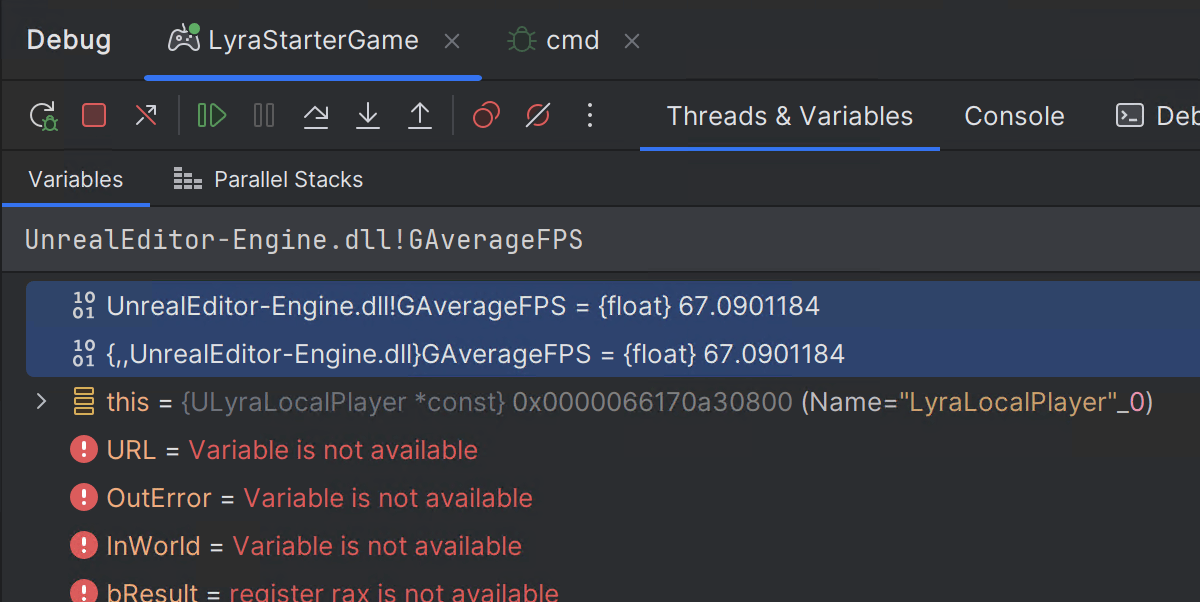
You can use module.dll!expr syntax to specify the context operator for an expression, telling the debugger where to look to resolve a symbol in a variable or breakpoint.
Unreal Engine projects also benefit from updates to the ReSharper C++ engine, including the new Inline Macro refactoring and the implementation of a popular request from users to allow the use of different syntax highlighting for various keywords. See the What's New in ReSharper C++ page for more details.
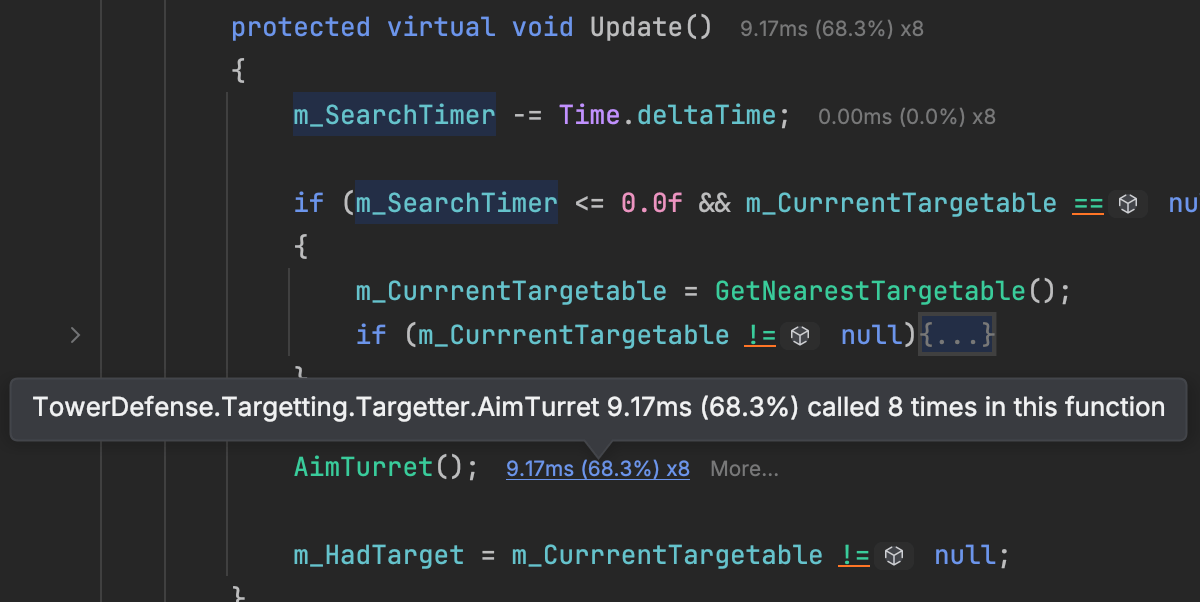
Unity
We've added an experimental integration with Unity's profiler. Once you've enabled it in the settings, clicking an entry in the profiler's Hierarchy view will open the file in Rider and show profile information for each line.
Learn more about this feature from Rider's documentation.

The IDE now correctly recognizes the version control bindings for packages added as external folders. This means you can commit to both your main project and any external package folders that you're working with.
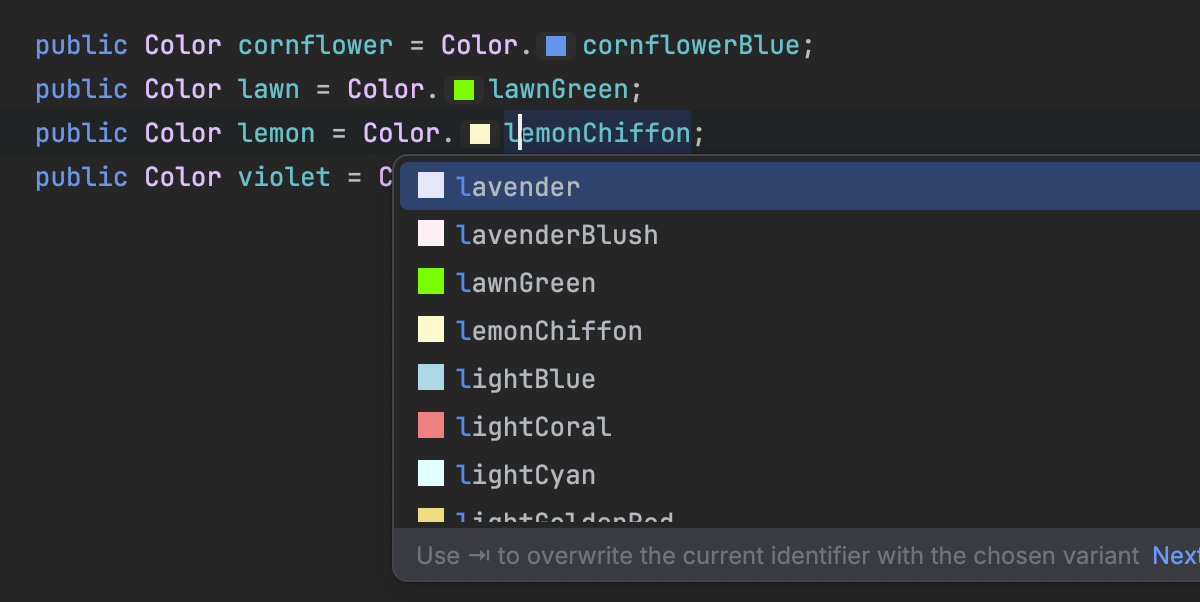
Rider's color highlighting now supports the additional named colors added in Unity 6.
Rider's remote development support now works better with Unity projects. Specifically, the shader variants selector is now available, and the Unity Explorer view will now correctly select the open file.
We've made some fixes to the Rider package bundled with Unity. For example, root namespaces are no longer occasionally missing, the Unity editor log file can be opened directly from the Unity settings page, and Rider entries are no longer duplicated on Linux.
Godot
Rider's support for Godot now supports .uid files, which were introduced in Godot 4.4. When files are moved with Rider or renamed with a refactoring, the corresponding .uid files are moved together to maintain project integrity.
Hot Reload now works for Godot C# projects, meaning that changes to C# code can be compiled and applied while the program is suspended at a breakpoint during debugging.
This release eliminates an unnecessary warning about a missing default constructor on abstract classes. We've also contributed a couple of pull requests to Godot to improve integration with Rider, such as one for automatically configuring an external editor's command line arguments when the selected editor is changed.
Cloud development
Support for Azure Function projects
Rider 2025.1 now supports running and debugging Azure Function projects via the .NET Aspire and the Azure Toolkit for Rider plugins. Please share any feedback you might have on the functionality in the comments on this ticket.
Support for AWS Lambda Function projects in .NET Aspire
The .NET Aspire plugin now also supports running and debugging AWS Lambda Function projects in Rider. For more information, please see this GitHub issue.
Support for remote debugging of Azure App Services
Rider 2025.1 now supports remote debugging of Azure App Services projects via the Azure Toolkit for Rider plugin (Azure Functions and Azure Web Apps are supported).
ウェブ開発
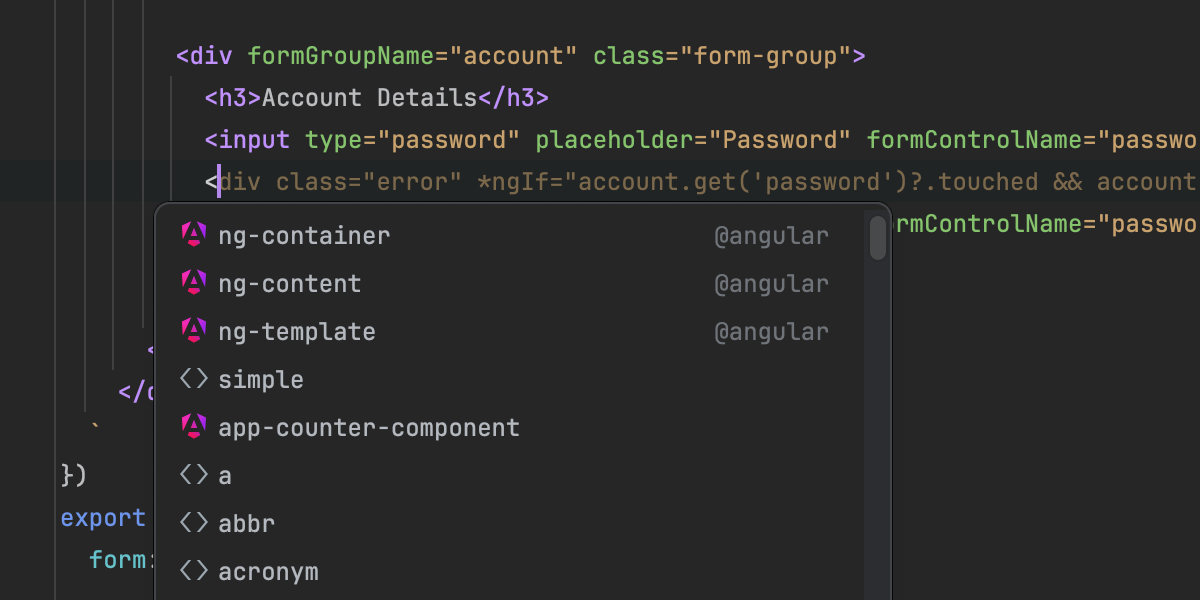
Angular サポートの強化
Rider 2025.1 comes with a host of improvements for Angular, namely:
- Enhanced support for host bindings.
- Angular 17.2 のシグナルクエリのサポート.
- Better support for reactive forms.
- Improved property suggestions for Angular bindings.
- Easier refactoring between inline and external component templates.
Proper support for Blazor WebAssembly publishing
Rider 2025.1 introduces proper support for Blazor WebAssembly (WASM) publishing. You can now use the .NET Publish | Publish to Folder configuration, which will use browser-wasm target runtime without encountering missing files in the output.
TypeScript smarter quick-fix prioritization with the service-powered type engine
Rider now prioritizes service-powered quick fixes, especially for imports, when internal suggestions are unavailable. This ensures that relevant fixes appear first, reducing friction in resolving issues and improving the overall coding experience.
詳細については、WebStorm の新機能ページをご覧ください。
その他
Code With Me
Previously, to start a Code With Me session in Rider, you had to manually enable it using the Enable Code With Me action and performing a restart. In Rider 2025.1, this step is no longer necessary — you can start a collaborative session right away without restarting the IDE.
JetBrains terminal: New architecture Beta
The 2025.1 release introduces the reworked terminal architecture, which is available in Beta. ターミナルが安定した標準準拠のコアで動作し、IDE のエディターを使用して UI をレンダリングするようになりました。 この変更により、ローカルかリモートかに関係なくさまざまなプラットフォームで互換性とパフォーマンスを維持しながら、新しい機能を導入できるようになっています。 今後の計画と進捗については、こちらのブログ記事をご覧ください。
デコンパイラー
Rider 2025.1 brings several improvements to the decompiler, enhancing support for the latest C# features and improving code readability. Here's what's new:
- Support for required members.
- Added support for the new
System.Threading.Locktype introduced in C# 13. - Support for
reffields andscopedparameter modifiers. - Support for
allows ref structgeneric anti-constraint. - Pattern-based using for
ref structtypes. - Support for string interpolation.
- Certain integer constants in decompiled code now include commented hexadecimal representations for better readability.
- Support for file-scoped namespaces.
